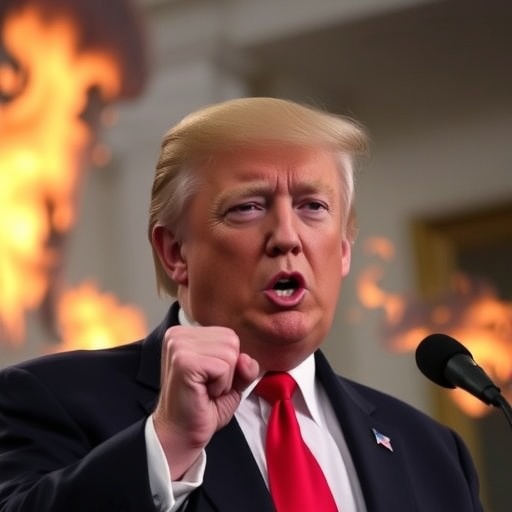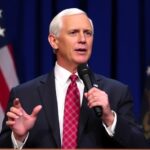Government shutdown Ignites Congressional Fury Over Trump’s Federal Spending Power Grab
In a dramatic escalation of US politics, the ongoing Government shutdown has plunged Washington into chaos, with Congress accusing President Trump of launching an unprecedented assault on their constitutional control over federal spending. As federal workers go unpaid and national parks close their gates, lawmakers from both parties are vowing to reclaim their authority, fearing that executive maneuvers could permanently erode the balance of power in American democracy.
The standoff began when Trump threatened to veto any spending bill that didn’t fully fund his border wall, leading to the shutdown that has now stretched into its third week. With over 800,000 federal employees furloughed or working without pay, the crisis isn’t just budgetary—it’s a raw test of who truly holds the purse strings in the world’s most powerful nation. Sources close to Capitol Hill describe closed-door meetings as “electric with tension,” where representatives and senators alike are drawing lines in the sand against what they call presidential overreach.
Lawmakers Unite in Rare Bipartisan Pushback Against Executive Actions
The Government shutdown has unexpectedly forged unlikely alliances on Capitol Hill, as Democrats and Republicans alike decry Trump‘s recent executive orders that attempt to redirect unspent funds toward immigration enforcement. Senate Majority Leader Mitch McConnell, typically a staunch Trump ally, issued a rare rebuke during a floor speech yesterday, stating, “The Constitution vests Congress with the power of the purse for a reason—it’s not a suggestion, it’s the law of the land.” His words echoed sentiments from House Speaker Nancy Pelosi, who added, “This isn’t about walls or borders; it’s about whether one branch of government can hijack federal spending at will.”
This bipartisan front marks a significant shift in politics, where partisan divides usually dominate. A poll conducted by Gallup last week revealed that 62% of Americans disapprove of the shutdown, with 71% believing Congress should have the final say on federal spending. Lawmakers are now circulating a resolution to challenge Trump‘s actions in court, arguing that they violate the Impoundment Control Act of 1974, which prohibits presidents from withholding congressionally appropriated funds.
Behind the scenes, negotiations have hit multiple snags. One senior Democratic aide revealed that Trump‘s team proposed using emergency powers to tap into the Defense Department’s budget for wall construction, a move that prompted immediate outrage. “It’s a power grab disguised as national security,” the aide said anonymously. Republicans like Senator Lindsey Graham have also expressed reservations, noting in a Fox News interview, “We support the president, but not at the expense of constitutional norms.” This unity could pressure Trump to back down, but insiders warn that his base’s fervor might embolden him further.
Federal Services Grind to a Halt: Real-World Toll on Americans
As the government shutdown drags on, the ripple effects are hitting everyday Americans hard, turning abstract politics into tangible hardships. National parks, including iconic sites like Yosemite and the Grand Canyon, have shuttered visitor centers and barred entry to avoid safety risks without staff. The National Park Service reports over 1.5 million visitors affected in the first week alone, with local economies in gateway towns losing an estimated $50 million daily.
Beyond recreation, essential services are strained. The IRS has halted tax refund processing, delaying billions in payments to taxpayers. Air traffic controllers and TSA agents continue working without pay, leading to increased flight delays—up 20% according to the FAA—and reports of understaffed security lines at major airports. Coast Guard personnel, often overlooked, are facing severe financial stress; one anonymous officer told CNN, “We’re out there saving lives, but our families are struggling to pay bills. This shutdown is breaking us.”
Federal spending cuts are also impacting research and health programs. The NIH has paused new grants, stalling cancer research trials that could affect thousands. Veterans Affairs hospitals are rationing supplies, with the American Legion estimating that 300,000 veterans’ claims are in limbo. Economists from the Brookings Institution project the shutdown could cost the US economy $1.2 billion per week, with low-income families hit hardest—food stamp processing has slowed, leaving 40 million recipients in uncertainty.
In a surprising twist, private sector responses are emerging. Companies like Amazon and Google have pledged donation drives for furloughed workers, while food banks in Washington, D.C., report a 300% surge in demand. This human element is amplifying calls in Congress for resolution, with Representative Alexandria Ocasio-Cortez tweeting, “The shutdown isn’t policy—it’s pain. Time for Congress to step up.”
Trump’s Border Wall Obsession Fuels the Shutdown Firestorm
At the heart of this government shutdown lies President Trump‘s unyielding commitment to his signature border wall, a project he promised during his 2016 campaign would curb illegal immigration. Yet, as federal spending debates rage, critics argue the wall’s estimated $25 billion cost is not just fiscal folly but a deliberate strategy to consolidate executive power. Trump reiterated his stance in a White House address last night, declaring, “Congress must fund the wall, or the shutdown continues. It’s about security, not spending games.”
However, data challenges this narrative. U.S. Customs and Border Protection statistics show illegal crossings at a 20-year low, partly due to expanded legal pathways under previous administrations. The wall’s efficacy is further questioned by experts; a report from the Cato Institute highlights that most drugs enter through legal ports, not remote desert stretches. Trump‘s push has divided his own party—moderate Republicans in border states like Texas worry about environmental impacts, with one rancher alliance estimating $1 billion in lost grazing land.
The president’s tactics include leveraging the shutdown for leverage in politics. He’s floated declaring a national emergency to bypass Congress, a move legal scholars say could set a dangerous precedent. During a rally in Texas over the weekend, Trump rallied supporters with chants of “Build the Wall,” but polls indicate waning support: a Quinnipiac survey shows only 38% of voters back using emergency powers for the wall, down from 45% in January.
Immigration advocates are mobilizing too. Groups like the ACLU have filed lawsuits against wall funding diversions, arguing they undermine federal spending integrity. In a statement, ACLU director David Cole said, “This isn’t governance; it’s governance by fiat. Congress must defend its role.” The wall’s symbolism has thus become a lightning rod, exacerbating the power struggle.
Constitutional Clash: Echoes of Past Shutdowns Reshape Modern Politics
This government shutdown isn’t the first to test Congress‘s resolve against presidential ambition, but its intensity draws parallels to historical flashpoints that redefined US politics. The 1995-1996 shutdowns under President Clinton, lasting 21 days, stemmed from similar federal spending disputes over welfare reform and resulted in public backlash that boosted Clinton’s re-election. Fast-forward to 2013, when a Tea Party-driven impasse over Obamacare furloughed 850,000 workers—much like today’s crisis—prompting a 16-day halt.
Yet, Trump‘s approach introduces novel elements. Unlike predecessors, he’s openly embraced the shutdown as a bargaining chip, tweeting last month, “Shutdowns are nothing compared to what we’ll get if we don’t secure the border.” Constitutional experts, including Yale Law Professor Akhil Amar, warn that this erodes the Framers’ intent. In an op-ed for The New York Times, Amar wrote, “Article I, Section 9 gives Congress exclusive spending authority. Trump‘s actions flirt with authoritarianism.”
Statistics underscore the stakes: Since 1976, there have been 20 shutdowns totaling over 100 days, costing taxpayers $11 billion in lost productivity, per the Congressional Budget Office. This one, already surpassing the 1995 record in economic damage projections, could linger if Congress doesn’t act. Bipartisan committees are reviewing past resolutions, with some proposing automatic pay for essential workers—a reform gaining traction amid the hardship stories flooding social media.
The clash also highlights evolving power dynamics. With Trump‘s use of social media to bypass traditional channels, Congress is adapting by amplifying their message online. Hashtags like #EndTheShutdown and #PowerOfThePurse have trended, amassing 5 million posts, turning the debate into a viral politics spectacle.
Looking ahead, the implications for federal spending are profound. If Trump prevails, future presidents might routinely impound funds, weakening Congress‘s leverage. Conversely, a congressional victory could spur reforms like balanced budget amendments, long sought by fiscal hawks. As negotiations resume this week, with a House vote on a clean spending bill scheduled for Friday, the outcome will ripple through the 2020 elections. Analysts predict that vulnerable incumbents in swing districts could face voter wrath, potentially flipping seats and altering the balance of power. For now, the government shutdown remains a stark reminder of democracy’s fragility, urging swift action to restore normalcy and safeguard constitutional checks.








